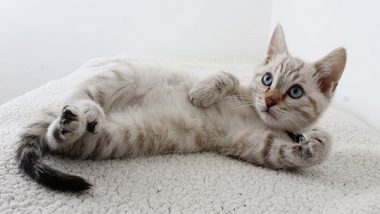California, December 31: Cats develop hypertrophic cardiomyopathy, or HCM, which causes the heart muscle to thicken. As the illness progresses, cats can develop blood clots in their hearts, which can dislodge and cause excruciating pain, anxiety, or even death.
According to a study published in the Nature Portfolio journal 'Scientific Reports', Davis's faculty of veterinary medicine has discovered that a cat's DNA affects how it reacts to a life-saving drug used to treat HCM, a cardiac condition that affects one in seven cats. Also Read | COVID-19 Surge: Chinese Manufacturing Weakens Amid Coronavirus Outbreak.
"We were consistently seeing cats that despite being on clopidogrel, were still forming blood clots," said corresponding author Josh Stern, professor of veterinary cardiology and geneticist with the UC Davis School of Veterinary Medicine. This led Stern and the research team to begin research in this area and identify mutations in the drug pathway that looked important. Data showed that nearly 20% of cats had resistance to the clopidogrel therapy, which is widely used by practitioners all over the world. Also Read | India Reports 226 Fresh COVID-19 Cases in Past 24 Hours; Active Cases Rise to 3,653.
"This study was about figuring out why some cats weren't responding as expected to clopidogrel therapy and leading us towards a more effective prescription," Stern said.
Researchers began a clinical trial on cats with HCM. They first tested the cats' ability to form blood clots. The cats' owners administered clopidogrel for 14 days, and the cats were tested again. Researchers were then able to test whether genetic mutations that they had identified within the drug pathway were responsible for reducing the drug's effectiveness.
"The end result is the ability to use a simple genetic test to make an educated decision about which drug therapy may be best for preventing blood clots in cats with HCM," Stern said.
While testing like this is not yet commercially available, researchers hope that eventually veterinarians will be able to rapidly test cats with HCM for these mutations as they are making prescribing decisions.
"We are very excited to be approaching this era where personalized or precision medicine in animals can catch up to precision medicine in humans," said co-author Ronald Li, an assistant professor of veterinary emergency and critical care and coagulation researcher, whose lab conducted much of the functional testing of the anticoagulant therapies, adding, "Just as we can't expect every human to respond to medication in the same way, we can't expect all cats to respond the same way either."
Researchers are hoping that in the future, personalized medicine for cats would allow veterinarians to test kittens for a whole host of genetic variants that would help inform medical decisions and treatments as they grow and require veterinary care.
Stern and the Cardiology Service at UC Davis Veterinary Medical Teaching Hospital continue to offer clinical trials aimed at optimizing treatment for cats with HCM. The team has a current fully funded clinical trial of a drug aiming to be the first veterinary drug to reverse this devastating disease.
The research was performed jointly by the Comparative Platelet and Neutrophil Physiology Laboratory and the Translational Cardiac Genetics and Pharmacogenomics Laboratory that are both housed within the Center for Companion Animal Health.
Co-authors of this study also include Karen Vernau, Nghi Nguyen, Maureen Oldach, Eric Ontiveros and Samantha Kovacs of UC Davis School of Veterinary Medicine; Yu Ueda of North Carolina State University; and Michael Court of Washington State University. Funding was provided by the Morris Animal Foundation to support the research and graduate student education.
(The above story is verified and authored by ANI staff, ANI is South Asia's leading multimedia news agency with over 100 bureaus in India, South Asia and across the globe. ANI brings the latest news on Politics and Current Affairs in India & around the World, Sports, Health, Fitness, Entertainment, & News. The views appearing in the above post do not reflect the opinions of LatestLY)













 Quickly
Quickly


